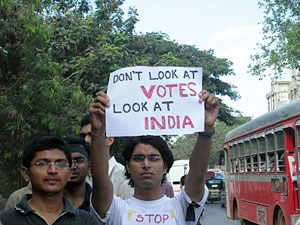 |
MUMBAI: I was asking a young college student about college elections in Mumbai and he responded as if I was talking about something alien to him, saying they only happen in some government colleges or in Bengal. Perception is more important than reality.
The recent fanfare about student elections reminded me of my years in Kolkata in the mid- eighties where many students seemed to go to college to change the world rather than concentrate on studies. While students stuck to politics in Kolkata, students in Karnataka decided to further their studies in IT and leave politics alone. Twenty years on Karnataka produces the finest IT graduates that have converted Bangalore into a Silicon Valley while Bengal still produces student leaders who never make it to national leadership.
The growth of India is fuelled by the youth like those in Mumbai and elsewhere that are observing how change can take place and keeping up with its pace. Suddenly new airports are built in couple of years, flyovers commissioned in less than a year, mass rapid transit systems like metro rail built in a few years. Youngsters in Mumbai talk of how India and China will dominate the world economic scene in the coming decades and how they will lead the new world economic order. They are taking the general election seriously, demanding more representations from the youth and supporting initiatives like the new party formed by professionals to fight the forthcoming federal elections.
For Nepal, there is a lot to learn. Sloganeering for three or five years in campuses lead nowhere till the youth finds its voice in the larger political debate. Rather than fighting tooth and nail with different politically affiliated student unions, they should fight for their rights within their own parties so that youth leaders take responsible positions within their parties and further the political reform process in the country.
What does student union politics mean? How many of these student leaders will actually find greater roles in the national politics in a democratic republic? What is the point of such student union elections and how are they still relevant in the larger political landscape? What do the political leaders think of the role of the student unions? Are the students just a tool to fulfill their political ambitions or do they still take note of the students shaping the future of their own political parties? The questions are endless.
The Nepali youth and student politics need real reform to prevent Nepal from being relegated to another West Bengal. We need to learn from the youth leadership in places where it is making its mark and changing the economic and political landscape. Mumbai minus the sporadic extremism of some political parties could be a benchmark to explore.



